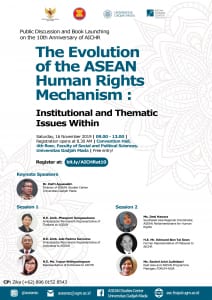Timor-Leste’s ASEAN Membership: To Be or Not to Be?
by Muhammad Fazlur Zikra Arifuddin (photo via VOAIndonesia)
As it is known for several years, the Association of Southeast Asian Nation (ASEAN) has always comprised of 10 members. However, since 2002 there is a new player waiting to be accepted within the association. Timor-Leste after gaining its independence from Indonesia has started to show its interest to contribute in ASEAN’s solidarity. Since its independence, Timor-Leste holds the status as an observer state despite its participations in ASEAN Annual Meeting of Foreign Ministers (AMM), ASEAN Regional Forum (ARF), and even agreed to the Southeast Asia’s Treaty of Amity and Cooperation (TAC) in 2007. Despite its participation efforts, Timor-Leste has not been granted its membership status although officially applied for in 2011. There are three possible reasons that might answer the question of why Timor-Leste is still not a member of ASEAN, which are due to change of ASEAN’s legal personality, what Timor-Leste has to offer, and foreign influence.
It is known that in the establishment of ASEAN, the first five members, Indonesia, Malaysia, the Philippines, Singapore, and Thailand, agreed to Bangkok Declaration or also known as ASEAN Declaration. Then, the constituent instrument of ASEAN is shifted towards ASEAN Charter, which was enacted in 2007. The charter has made the admission of a new member more difficult with the additional requirements laid out in Article 6 Section 2 that states Location in the recognized geographical region of Southeast Asia; Recognition by all ASEAN Member States; Agreement to be bound and abide by the Charter; and Ability and willingness to carry out the obligation of Membership. While the Declaration’s requirements are only the matter of location and capable to adhere the aims principles and purposes, made it easier for Cambodia, Laos, Vietnam, and Myanmar to gain membership compared to Timor-Leste. While the first three requirements are met, the latest are still in process of being required. In ensuring the fulfillment of the requirements, ASEAN established ASEAN Coordinating Council Working Group (ACCWG) after Timor-Leste’s application. To be a new member, under the Charter, Timor-Leste has to align its legal framework to with ASEAN legal instruments and ASEAN Community Blueprint. The study shows that by 2015, Timor-Leste has only 1.6% binding its legal frameworks with ASEAN’s agreement while it was targeted to be fully compliant with the increase 50% in legal alignment by June 2018.
In further explaining Timor-Leste’s ability and willingness, it has reached to the question of ‘What Timor-Leste has to offer?’ Despite its past in struggling for independence, Timor-Leste has scored 7.19 in the 2018 Democracy Index by The Economist Intelligence Unit, placed as the highest democracy state among other ASEAN members. Also, Timor-Leste has successfully conducted its premier election without domestic political turmoil. This shows the accountability of Timor-Leste in its ability to carry out the would-be tasks as ASEAN member. Timor-Leste also had opened its embassies in all of ten ASEAN members, which is an important parameter for them to be considered as a new member. All member states supports Timor-Leste’s admission and it come without full assurance, stating that Timor-Leste is still lacking in economic capability and human resources. However, this statement could be proven wrong. According to data provided by the World Bank, Timor-Leste’s GDP per capita in 2018 placed above Cambodia’s and Myanmar’s. This also shows the capability of Timor-Leste’s economy that is comparable with the two ASEAN member mentioned previously. Meanwhile, Timor-Leste still needs to improve its human resources as its Human Capital Index was listed at the lowest among all the ASEAN members.
Last but not least, another factor that influence the prolonging of Timor-Leste’s membership admission is the fear of possible foreign influence. It is important to be noted that, China as one of the first country to recognize Timor-Leste, has been sending helps and assistance towards Timor-Leste since its independence. This includes mostly infrastructure, military and government facilities. As mentioned previously, improvement in economy and human resources is needed by Timor-Leste in securing its possibility to become a member of ASEAN. In achieving this, Timor-Leste is still in progress for improvement, and it is impossible without any help. On 23rd March 2017, Timor-Leste is approved to be a member of the Asian Infrastructure Investment Bank (AIIB), which is backed by China, to improve its economic and social development. Another apparent fact is that Timor-Leste also joined China’s Belt and Road Energy Partnership and received aid in building infrastructures, including Timor-Leste National Power Grid, Suai Highway, as well as Tibar Bay Port. These aids are helpful for Timor-Leste’s development, however, it is problematic at the same time as ASEAN by accepting Timor-Leste would mean that China may influence Timor-Leste’s decision in ASEAN. Thus, hampering the consensus decision-making process. One example would be the veto by Cambodia and Laos in the issue of South China Sea seems to be defending China’s interest and hampers the ASEAN consensus in Declaration of Conduct in the South China Sea.
In conclusion, the prolonging process of Timor-Leste’s admission to ASEAN is due to shift of ASEAN Declaration towards ASEAN Charter, which allows ASEAN in delaying the process; Timor-Leste’s economy and human resources; and the likelihood of foreign influence within ASEAN in the future. Possibility and impossibility for Timor-Leste’s admission are included within the aforementioned reasons. Despite the obstacles present ahead, Timor-Leste should continue to be tenacious in their effort for ASEAN membership.
Muhammad Fazlur Zikra Arifuddin is an Undergraduate Student majoring in International Relations, Universitas Gadjah Mada. He has recently completed the internship program at ASEAN Studies Center UGM. Zikra could be reached through email zika_arf@yahoo.co.id.

